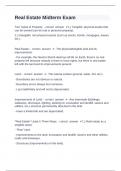Real Estate Midterm Exam
Two Types of Property: - correct answer ✔1.) Tangible: physical assets that
can be owned (can be real or personal property).
2.) Intangible: non-physical assets (such as stocks, bonds, mortgages, leases,
etc.).
Real Estate: - correct answer ✔- The physical/tangible land and its
improvements.
- For example, the Neutron Bomb destroys all life on Earth, there'e no real
property left because nobody is there to have rights, but there is real estate
left with the land and its improvements present.
Land: - correct answer ✔- The natural surface (ground, water, dirt, etc.).
- Boundaries are not obvious or natural.
- Boundary errors always hurt someone.
- Last indefinitely and will not be depreciated.
Improvements of Land: - correct answer ✔- Any manmade (buildings,
walkways, driveways, lighting, parking lot, excavation and landfill, sewers and
utilities, etc.) structure permanently attached to the land.
- Have a limited life and are depreciated.
"Real Estate" Used in Three Ways: - correct answer ✔1.) Real estate as a
tangible asset:
- "Raw" land.
- Improvements to the land: excavation and landfill, sewers and other utilities,
roads and driveways.
- Structures (improvements on the land).
,2.) Real estate as a bundle of rights:
- Exclusive possession of the real property.
- Use or enjoyment (can use as rental property to generate cash flow).
- Disposition.
- Can be unbundled in many ways.
3.) Real estate as an industry and profession:
- For example: brokerage, development, leasing, property management, asset
management, real estate law, appraisal, government regulation and taxation,
etc.
Real Estate in the Economy: - correct answer ✔- Half of the world's wealth.
- Generates over 28% of U.S gross domestic product (GDP).
- Real estate makes up about 2/3 of our economy.
What Determines Real Estate Values? - correct answer ✔- Interactions in 3
distinct markets/sectors:
1.) User (space) markets.
2.) Capital markets.
3.) Governmental sector(s).
User Markets: - correct answer ✔- Market for the physical real estate.
- "Buyers" receive the right to use space.
- Where rental rates are determined.
- These markets are very "local" and usually highly competitive.
User Markets Demand & Supply: - correct answer ✔1.) On the demand side:
,- Individuals, households, and firms who require space either for consumption
or production purposes.
2.) On the supply side:
- Real estate owners/operators who rent space to tenants.
*Both demand and supply side of user markets are very specific to location
and building type.*
Capital Markets: - correct answer ✔- Real estate competes for funds in
capital market with other asset classes, such as stocks and bonds.
- Investors select a mix of investments based on expected returns and risk.
Public v Private Capital Markets: - correct answer ✔1.) Public:
- Small homogeneous units (shares) of ownership in assets trade in public
exchanges.
- Many buyers and sellers.
- Price quotes available for all to see.
- Characterized by a high degree of liquidity.
- Informatioanlly efficient.
2.) Private:
- Absence of centralized market (or even price lists).
- Assets trade infrequently in private transactions (thus a lack of
transparency).
- Common for "whole" assets to be traded in a single transaction
(indivisibility).
- Less liquidity than public markets.
- Higher transaction costs.
, What Are Rights? - correct answer ✔1.) Claims that the government is
obligated to enforce:
- Derived from the Constitution.
- Different from raw power.
2.) Non-revocable:
- Can be reduced in the interest of health, safety, and welfare.
3.) Enduring:
- Not limited to the memory of owners or others.
- Cannot be nullified by other persons or by government.
Personal Rights v Property Rights: - correct answer ✔1.) Personal Rights:
- Freedoms guaranteed by the Constitution.
- Supreme Court interpretations of the Constitution.
2.) Property Rights:
- Exclusive possession.
- Enjoyment of the use or benefit: use, collect rents, harvest.
- Freedom to dispose as one pleases (within the limits of safety): sell, convert,
rebuild, etc.
Real Property v Personal Property: - correct answer ✔1.) Real Property:
- The bundle of rights (ownership, property rights, etc.).
- Life, liberty, and property written in the Declaration of Independence from
Thomas Jefferson.
*Real estate can never be real property and real property can never be real
estate.
2.) Personal Property:
- "Chattel".




